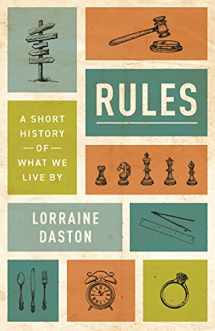
Rules: A Short History of What We Live By (The Lawrence Stone Lectures, 13)
Book details
Summary
Description
Review
"Fascinating. . . . [Daston] writes with a twinkling wit."---Timothy Farrington, Wall Street Journal
"In considering a series of historic anecdotes and texts, Daston helps us see rules (and their neighbors, such as laws and regulations) through the concepts of thickness and thinness, paradigms and algorithms, failures (it was nearly impossible to get eighteenth-century Parisians to stop playing ball in the streets), and states of exception. . . .By the end of Daston’s book, one feels a sense of clarity about how to think about rules, alongside a gentle sense of despair concerning what kinds of rules to hope for."---Rivka Galchen, New Yorker
"
[Daston writes] witty, wide-ranging and well-researched inquiries into the picaresque careers of such notions as ‘reality,’ ‘nature,’ ‘rationality,’ ‘objectivity’ and ‘order,’ and in her latest book she brings her wry historical intelligence to bear on the capacious concept of ‘rules.’ The delights of her scholarship are on full display."---Jonathan Rée, Times Literary Supplement
"A timely release that will satisfy the mathematically curious, who hunger to know how algorithms actually work, as well anyone who loves debating policy." ― Library Journal
"
Rules is ultimately one of the best written, most profound, and most far-reaching works of intellectual history that I have ever read."---Ernest Davis, SIAM News
A panoramic history of rules in the Western world
Rules order almost every aspect of our lives. They set our work hours, dictate how we drive and set the table, tell us whether to offer an extended hand or cheek in greeting, and organize the rites of life, from birth through death. We may chafe under the rules we have, and yearn for ones we don’t, yet no culture could do without them. In Rules, historian Lorraine Daston traces their development in the Western tradition and shows how rules have evolved from ancient to modern times. Drawing on a rich trove of examples, including legal treatises, cookbooks, military manuals, traffic regulations, and game handbooks, Daston demonstrates that while the content of rules is dazzlingly diverse, the forms that they take are surprisingly few and long-lived.
Daston uncovers three enduring kinds of rules: the algorithms that calculate and measure, the laws that govern, and the models that teach. She vividly illustrates how rules can change―how supple rules stiffen, or vice versa, and how once bothersome regulations become everyday norms. Rules have been devised for almost every imaginable activity and range from meticulous regulations to the laws of nature. Daston probes beneath this variety to investigate when rules work and when they don’t, and why some philosophical problems about rules are as ancient as philosophy itself while others are as modern as calculating machines.
Rules offers a wide-angle view on the history of the constraints that guide us―whether we know it or not.


We would LOVE it if you could help us and other readers by reviewing the book
Book review



